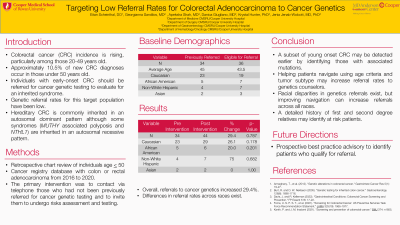Back


Poster Session D - Tuesday Morning
Category: Colorectal Cancer Prevention
D0166 - Targeting Low Referral Rates for Colorectal Adenocarcinoma to Cancer Genetics
Tuesday, October 25, 2022
10:00 AM – 12:00 PM ET
Location: Crown Ballroom

Has Audio

Eitan Scheinthal, DO
CMSRU/Cooper University Hospital
Camden, NJ
Presenting Author(s)
Eitan Scheinthal, DO, Georgianna Sandilos, MD, Apeksha Shah, MD, Danica Giugliano, MD, Jenia Jenab-Wolcott, MD, PhD
CMSRU/Cooper University Hospital, Camden, NJ
Introduction: Colorectal cancer (CRC) incidence is rising in those 20-49 years old. Approximately 10.5% of new CRC diagnoses occur in those under 50 years old. Individuals with early-onset CRC should be referred for cancer genetic testing to evaluate for an inherited colorectal syndrome. Historically, the rate of genetics referral for this target population has been low. We identified a cohort of patients eligible for cancer genetic risks assessment based on young onset of CRC at our institution.
Methods: This is a retrospective chart review of individuals age ≤50 in the cancer registry database with colon or rectal adenocarcinoma from 2016 to 2020. Data was collected on demographics, age at diagnosis, tumor histology, germline testing, and referral to genetic services. The primary intervention was to contact via telephone those who had not been previously referred for cancer genetic testing and to invite them to undergo risks assessment and testing.
Results: Initially, 86 individuals were identified and 34 (39.5%) were previously referred to cancer genetics. Of the remaining patients, 36 (69.2%) were alive at the time of the study. The average age at cancer diagnosis was 43.5 years-old. A majority of the panel was Caucasian (52.7%). Ten patients (20.4%) were contacted and referred for an appointment, representing a 29.4% increase in referrals (P=0.787). The remaining 79.6% of patients either declined screening, were unable to be contacted, or were deemed inappropriate for referral. There was not a statistically significant increase in referral rates among all races. Non-white Hispanics had the largest increase at 75% (P=0.682) followed by Caucasians at 26.1% (P=0.178). All individuals who were successfully contacted and agreeable to referral have pending appointments with cancer genetics.
Discussion: While the reasons for the rise in CRC in younger individuals are not yet well understood, a subset of these cancers may be detected earlier by identifying those with CRC associated mutations. The approach to genetic testing hinges on a detailed family history that can be easily missed. In order to increase inclusivity, utilizing navigation based on age criteria and tumor subtype to identify patients may increase referral rates to genetics counselors. In this study we did not achieve statistical significance, likely due to small sample size. Still, racial disparities in genetics referrals exist and improving navigation can increase referrals across all races.
Disclosures:
Eitan Scheinthal, DO, Georgianna Sandilos, MD, Apeksha Shah, MD, Danica Giugliano, MD, Jenia Jenab-Wolcott, MD, PhD. D0166 - Targeting Low Referral Rates for Colorectal Adenocarcinoma to Cancer Genetics, ACG 2022 Annual Scientific Meeting Abstracts. Charlotte, NC: American College of Gastroenterology.
CMSRU/Cooper University Hospital, Camden, NJ
Introduction: Colorectal cancer (CRC) incidence is rising in those 20-49 years old. Approximately 10.5% of new CRC diagnoses occur in those under 50 years old. Individuals with early-onset CRC should be referred for cancer genetic testing to evaluate for an inherited colorectal syndrome. Historically, the rate of genetics referral for this target population has been low. We identified a cohort of patients eligible for cancer genetic risks assessment based on young onset of CRC at our institution.
Methods: This is a retrospective chart review of individuals age ≤50 in the cancer registry database with colon or rectal adenocarcinoma from 2016 to 2020. Data was collected on demographics, age at diagnosis, tumor histology, germline testing, and referral to genetic services. The primary intervention was to contact via telephone those who had not been previously referred for cancer genetic testing and to invite them to undergo risks assessment and testing.
Results: Initially, 86 individuals were identified and 34 (39.5%) were previously referred to cancer genetics. Of the remaining patients, 36 (69.2%) were alive at the time of the study. The average age at cancer diagnosis was 43.5 years-old. A majority of the panel was Caucasian (52.7%). Ten patients (20.4%) were contacted and referred for an appointment, representing a 29.4% increase in referrals (P=0.787). The remaining 79.6% of patients either declined screening, were unable to be contacted, or were deemed inappropriate for referral. There was not a statistically significant increase in referral rates among all races. Non-white Hispanics had the largest increase at 75% (P=0.682) followed by Caucasians at 26.1% (P=0.178). All individuals who were successfully contacted and agreeable to referral have pending appointments with cancer genetics.
Discussion: While the reasons for the rise in CRC in younger individuals are not yet well understood, a subset of these cancers may be detected earlier by identifying those with CRC associated mutations. The approach to genetic testing hinges on a detailed family history that can be easily missed. In order to increase inclusivity, utilizing navigation based on age criteria and tumor subtype to identify patients may increase referral rates to genetics counselors. In this study we did not achieve statistical significance, likely due to small sample size. Still, racial disparities in genetics referrals exist and improving navigation can increase referrals across all races.
Disclosures:
Eitan Scheinthal indicated no relevant financial relationships.
Georgianna Sandilos indicated no relevant financial relationships.
Apeksha Shah indicated no relevant financial relationships.
Danica Giugliano indicated no relevant financial relationships.
Jenia Jenab-Wolcott indicated no relevant financial relationships.
Eitan Scheinthal, DO, Georgianna Sandilos, MD, Apeksha Shah, MD, Danica Giugliano, MD, Jenia Jenab-Wolcott, MD, PhD. D0166 - Targeting Low Referral Rates for Colorectal Adenocarcinoma to Cancer Genetics, ACG 2022 Annual Scientific Meeting Abstracts. Charlotte, NC: American College of Gastroenterology.
